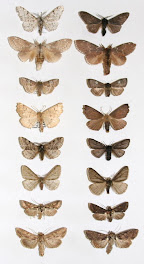
The two animals in the bottom row are quagga. They became extinct around a hundred years ago. Recently researchers, using hides and a skeleton in museum collections were able to unravel phylogeny and evolutionary history of the quagga:
The quagga, Equus quagga, a South African relative of horses and zebras, having a front half with zebra-like stripes and a back section like a horse with no marking, became extinct about 100 years ago. The pelt from a quagga museum specimen was the subject of tissue sampling that launched the field of ancient DNA analysis.
"Twenty years ago this exact species opened the field of ancient DNA studies on extinct animals," said one of the authors, Gisella Caccone, senior research scientist in the Department of Ecology and Evolutionary Biology at Yale. "Now, thanks to technological advances in the field, we revisited the story and used a population level approach to this question by analyzing a larger fragment of DNA and multiple specimens."
In the past, the quagga has alternatively been described as a species and a subspecies of the Plains zebra.These researchers asked how and when the quagga diverged from all the remaining related horses, zebras, and asses. They compared the genetics, coat color and habitats of existing zebras with related extinct species.
Results indicate that the quagga descended from the plain's zebra some 120,000-290,000 years ago:
These results suggest that the quagga descended from a population of plains zebras that became isolated and the distinct quagga body type and coloring evolved rapidly.
This study reveals that the Ice Age was important not just in Europe and North America, but also in Africa.
"The rapid evolution of coat color in the quagga could be explained by disrupted gene flow because of geographical isolation, an adaptive response to a drier habitat, or a combination of both of the two forces," said Caccone.
Sounds like a punctuational kind of event to me, but I haven't read the original study.








